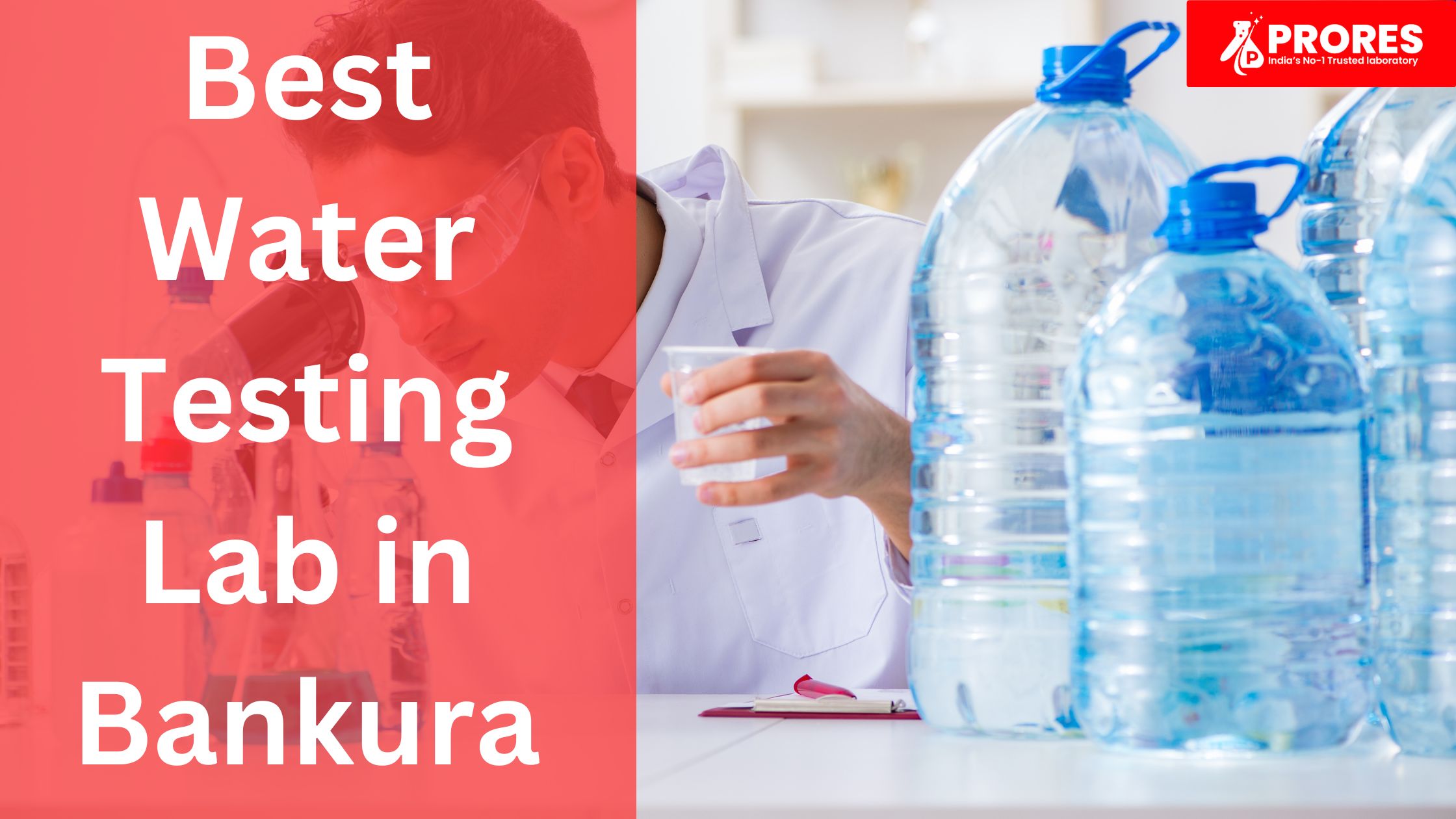Best Water Testing Lab in Bankura - We Make Your Drinking Water 100% Safe
Seeking the best water testing laboratory in Bankura is a legitimate concern given the escalating pollution in the water supply. As rapid industrialization and urbanization make the quest for safe drinking water increasingly difficult, water often harbours dangerous pathogens, bacteria, and toxic chemicals, which pose significant health risks. Despite strict waste disposal regulations, these issues continue. Moreover, utilizing river water for human activities has increased the risk of various diseases. The depletion and contamination of groundwater with arsenic and high iron levels are particularly concerning. Consequently, comprehensive water testing, especially of drinking water, is essential. In the fight against the surge of waterborne diseases, the expertise of a committed water testing lab in Bankura is vital. Prores Lab, acclaimed as the premier water testing lab in Bankura, is committed to your service. We employ advanced technology to detect harmful contaminants in your drinking water, ensuring its safety.
Top Government-Approved Testing Lab in Bankura: What are the Dangers of Untested Water?
| Causes | Effects |
|---|---|
| Human Waste | The elevated population density along riverbanks exacerbates the sewage issue, as three-quarters of the sewage from the northern plains is discharged into rivers without treatment. As a result, waterborne illnesses like dysentery, cholera, hepatitis, and severe diarrhoea emerge from the polluted river waters. |
| Industrial Waste | The growth of industrial cities, tanneries, chemical factories, and hospitals along the riverbanks has exacerbated pollution. Consequently, there has been a decrease in the populations of freshwater fish and turtles, and the Ganges river dolphin is now classified as an endangered species. |
| Microbial contamination | The well-established recognition of bacteria, viruses, parasites, and pathogens, often originating from human or animal waste, is widely acknowledged. |
| Chemical Contamination | Contamination may arise from natural metals and minerals, man-made chemicals, industrial pollutants, and agricultural runoff. Compounds like arsenic, lead, nitrates, and pesticides are linked to health issues such as cancer, birth defects, kidney damage, and neurological disorders. |
Why Do You Need a Water Quality Testing Lab in Bankura?
A Water Quality Testing Lab in Bankura is necessary to ensure the safety and suitability of water for various uses, given the potential health risks associated with water contamination. Pure water is crucial for obtaining accurate laboratory results, as impurities can influence clinical outcomes. Water quality testing is essential for determining the safety and appropriateness of water for consumption and various uses, thereby protecting public health and the environment. It is imperative to protect the inhabitants of Bankura from the significant health risks associated with water contamination. Governments have implemented standards to ensure the reliability of water testing in laboratories. Failure to adhere to these standards could result in the accidental consumption of polluted water, highlighting the importance of compliance. Furthermore, the government has set guidelines to maintain the precision of laboratory water tests. Erroneous results may lead to the unintentional ingestion of contaminated water, making it critical to ensure that testing aligns with governmental regulations to safeguard public health.
Additionally, government accreditation, such as the certification from the National Accreditation Board for Testing and Calibration Laboratories (NABL), is often necessary for formal recognition. These accrediting organizations implement strict quality control measures to ensure that laboratories maintain high levels of proficiency and adhere to stringent standards. Therefore, possessing government certification indicates that a laboratory performing water tests complies with exacting reliability and quality benchmarks. This bolsters the public's trust in the laboratory's results and the overall integrity of the water safety monitoring system. Moreover, it is mandated by regulations that only government-approved laboratories are authorized to carry out water quality testing in Bankura, guaranteeing adherence to all prescribed statutory standards for water quality evaluation.
How Do Water Testing Laboratories in Bankura Conduct Tests?
- Step One: Accurate sample collection is crucial because insufficient data collection can result in incorrect conclusions. Specialists follow strict protocols to collect samples from wells, taps, rivers, and other water sources to avoid contamination. Choosing a sampling location requires assessing the anticipated water use and potential risks of contamination. To maintain the samples' integrity, they are carried in sterilized containers.
- Step Two: Upon reaching the laboratory, samples are immediately transferred and stored prior to processing, following predefined protocols. Some assays might necessitate adding preservatives to preserve the analytes' integrity. High-precision analysis often requires sophisticated equipment like mass spectrometry, gas chromatography, and spectrophotometry. Conversely, simpler techniques such as titration for parameter analysis or colourimetric assays are applicable for various analyses. It is crucial to maintain a consistent temperature during transport to ensure the precision of certain tests.
- Step Three: Specialized personnel collect water samples using precise equipment and methods for laboratory analysis. The selection of tests depends on the intended use of the water and the likely contaminants of concern. Common water quality parameters measured include pH, dissolved oxygen, turbidity, temperature, and conductivity:
- Physical characteristics include hue, temperature, and cloudiness/turbidity.
- Chemical characteristics include pH, conductivity (dissolved solids), and particular ions (e.g., nitrates, arsenic, lead).
- Biological parameters such as bacterial count (the number of dangerous microorganisms present).
- Step Four: The water testing process culminates in data analysis and report generation. Specialists evaluate the results against specific usage requirements to ensure compliance with established norms and standards. A comprehensive report is produced, detailing the testing procedures used, the findings, and their conformity with regulatory benchmarks. This report determines if the water meets the stringent quality standards for its intended use.

Prores Lab: The Best Testing Lab for Water In Bankura
| Benefits | Explanation |
|---|---|
| Detecting Contamination | Testing water is essential for detecting harmful contaminants, including bacteria, viruses, chemicals, and minerals. Early identification of these substances enables the administration of appropriate treatment, which helps in preventing diseases. |
| Monitoring Water Treatment | Consistent testing guarantees that filtration facilities and other water treatment systems are operating correctly and effectively eliminating contaminants. |
| Pollution Monitoring | Water testing is vital for identifying pollutants that can damage aquatic life and ecosystems, such as industrial waste and agricultural runoff. |
| Sustainable Management | Grasping the significance of water quality is vital for the efficient management of water resources and aids in averting the contamination of our water supplies by pollutants. |
| Water Treatment Requirements | Test results can inform the decision-making process in the development of water filtration systems and in addressing particular water quality concerns. |
| Early Intervention | Testing private wells and water sources is crucial for ensuring the safety of water in homes and for consumption. The early detection of water quality issues allows for prompt corrective actions, minimizing adverse effects. |
| Peace of Mind | Regular testing is essential to ensure that filtration plants and other water treatment systems are functioning properly and efficiently removing contaminants. |
Conclusion
FAQs
- What is water testing in a lab?
- Water testing involves analyzing water samples to identify any potentially harmful substances.
- Why is a drinking water testing lab in Bankura necessary?
- TTesting can help identify pollution sources, such as defective sewage systems or industrial waste when contamination is detected.
- How can public health be safeguarded by a water quality testing lab in Bankura?
- Contamination of water with harmful bacteria, viruses, and heavy metals can lead to serious long-term health issues such as diarrhoea and typhoid. Regular testing is crucial to detect these contaminants and ensure the safety of the drinking water supply.
- Why are water pollution levels monitored by water testing laboratories in Bankura?
- Bankura is grappling with pollution issues and the overuse of its water resources. Consistent monitoring of water quality helps authorities to detect patterns and take necessary measures.
- How can we handle water sustainably?
- Regular testing aids in the detection of potential risks, thereby enabling proactive measures to safeguard and conserve this essential resource. As a result, it promotes the implementation of wise water management strategies.
- What is the recommended frequency of water testing?
- Several factors, including the water source and potential contamination risks, determine the frequency of water testing. It is advisable to test your drinking water at least annually.
- If my water is polluted, what can I do?
- Depending on the contamination level, it may be necessary to secure an alternative water source, utilize a filter, or boil the water.
- For water quality assurance, it is advisable to have it tested at a reputable facility like Prores Lab.
- Which water testing lab in Bankura is the best?
- Without a doubt, the best water testing lab in Bankura is Prores Lab.
What Our Clients Say!
Apply For Franchise
Partner With Us






